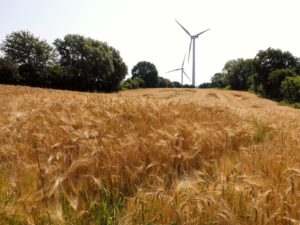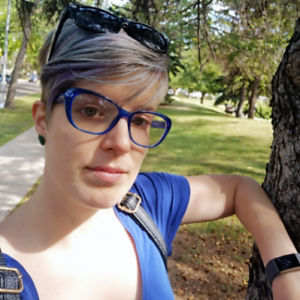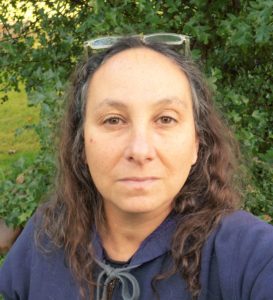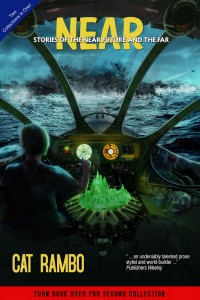Storytelling Ourselves Out of Paralysis
by Christina De La Rocha and Ariel Kroon
One of the best things about science fiction is that it lets us try futures on for size. Do you look good in dystopia, finding the hero within while you rise from the wreckage of civilization, raging through the thrills of a dangerous world? Or do you look better invading the spaces that technology is about to open up for us, stumbling into unintended consequences hilarious, heart-wrenching, and severe? Â
The growing solarpunk movement thinks you’d look best in a near future of the sort we’d actually like to live in. The cheerful color scheme complements every complexion. The hope here is that by narrating ourselves into a future where things have turned out well, we can increasingly believe that such a future is possible. Then, armed with that vision of what we could accomplish, we might wake up and start working on it instead of keep sleepwalking into the perfect storm of man-made misfortunes bearing down upon us. Â
 Because we really are sleepwalking right now. To take it a metaphor further, we, the people of Earth, are the deer staring paralyzed into the headlights of global warming, decimated ecosystems, accelerating economic inequality, racism, sexism, homophobia, transphobia, misogyny, failing states, refugees, wars, the pandemic, misinformation and propaganda, totalitarianism, hatred, and division. The here and now could easily turn out to be the prologue of a dystopia that only the most savage will enjoy and it’s hard to imagine there will be much in the way of heroes. Â
Because we really are sleepwalking right now. To take it a metaphor further, we, the people of Earth, are the deer staring paralyzed into the headlights of global warming, decimated ecosystems, accelerating economic inequality, racism, sexism, homophobia, transphobia, misogyny, failing states, refugees, wars, the pandemic, misinformation and propaganda, totalitarianism, hatred, and division. The here and now could easily turn out to be the prologue of a dystopia that only the most savage will enjoy and it’s hard to imagine there will be much in the way of heroes. Â
In fact, we’re doing worse than sleepwalking. Those of us who have been shouting about greenhouse gas emissions and the state of the environment for decades are baffled that the collective response of humanity has been to drive its car faster toward the brick wall. Â
But at the individual level, it’s almost understandable. We are worried but overwhelmed, thinking, how could I possibly do anything about every single issue we’re facing? How could any action I take make any difference at all? So what if we’re on track for having to deal with catastrophic climate change and ecological collapse at the same time that the maximum number of human beings that will have ever simultaneously existed on Earth will all be needing to eat, live somewhere, and have a job. What can I do about that (except move to Montana and start stockpiling guns, ammo, and freeze-dried food)? Â
But, honestly, enough of that narrative, says solarpunk. What a horrible, self-fulfilling prophecy. Better to decide that we can do something about these problems. That we can create a positive future for ourselves, especially if we start solving problems together. After all, problem solving and cooperation are things our species excels at. Â
Would it help get us moving if we started weaving ourselves into narratives in which we have acted to make the future a better place to be? Why don’t we try it? Let’s start creating visions of ourselves having dramatic episodes in fabulous yet feasible futures. Â
That can mean setting stories‒full of human dreams, passions, conflicts, and conundrums‒in a world where we have changed the way we do everything, having gone green, clean, friendly, fair, just, inclusive, and supportive of as many people as possible. It can also mean telling tales set amongst the conflicts that will arise as we ditch fossil fuels for renewables (hopefully) in time to avert global warming disaster. Other stories might involve our attempts to engage safely in sun-shading or carbon sequestration to dial global warming down before we trip over climate tipping points of no return. In these stories, characters could romp through cities that we have revamped into working better for people or through lushly rewilding landscapes made possible by our overhaul of agriculture and our abandonment of overconsumption. Some tales could even be fables woven through with the warmth of cultures that have backed away from today’s every person for themselves attitude in favor of community, belonging, and collective problem solving. Â
But how could stories showing us thriving in the midst of or on the other side of the remaking we need to do to our societies, methods of energy production, and infrastructure help us take action? Â
Well… what if they stoked our enthusiasm for the revolution we are about to undergo that will be as disruptive as the Industrial Revolution that dragged us toward modernity and didn’t rest until it had set the stage for world wars, the collapse of a couple of empires, and the covering of so much of the planet in roads, cars, concrete, and a whole lot more people? Then we would no longer be paralyzed by our fear of such a great set of changes. Â
But even if these stories just normalize little things, like driving electric cars, living near wind farms, having solar panels and heat pumps, or availing ourselves of the extensive and convenient public transportation networks that we deserve to have, they could still help us shake that fear of the future that has been paralyzing us. Â
It is, at any rate, worth a shot, and it’s a shot that Solarpunk Magazine is taking. Â
 You probably haven’t met Solarpunk Magazine yet, as it’s the new kid on the block who hasn’t actually moved in yet. Our first issue will burst upon the scene in January 2022. We already have some great stories, pleasing poems, and fabulous non-fiction lined up for you. Â
You probably haven’t met Solarpunk Magazine yet, as it’s the new kid on the block who hasn’t actually moved in yet. Our first issue will burst upon the scene in January 2022. We already have some great stories, pleasing poems, and fabulous non-fiction lined up for you. Â
But paying contributors professional rates takes funding and, in his day and age, that means a Kickstarter campaign. Check out ours, which will run until October 30, 2021. For $5, you can secure your copy of our inaugural issue. $10 gets you the first two issues. $25 scores you the whole first year (which is six issues). Plenty of other goodies are on offer as well! Â
Every $4K that rolls in funds one issue. As of October 11th, we’ve secured enough funding for the first four issues, and we’re hopeful about getting enough funding for the entire first year. So come pitch in and help us storytell a wonderful future into existence. Â
Speaking of which, you can also support Solarpunk Magazine by writing. We need your solarpunk stories, poems, essays, interviews, and articles. Our first ever window for submissions will be open from Nov 1-14, 2021 and we are looking forward to reading your visions of a future we could happily inhabit together in peace, prosperity, and greenery.
 BIOS: Ariel Kroon and Christina De La Rocha are non-fiction editors at Solarpunk Magazine.
BIOS: Ariel Kroon and Christina De La Rocha are non-fiction editors at Solarpunk Magazine.
Ariel (she/her) is a recent PhD in English Literature, specifically in the field of Canadian post-apocalyptic science fiction published between 1948 and 1989. In addition to academic interests in feminist posthumanism and affect theory, she enjoys and pursues speculative futures with an environmental bent, queer optimism, radical hope, and garden dirt. She is an ancient Tumblrkid and hugely appreciative of solarpunk and hopepunk communities. You can find some of her talks on YouTube or read her personal webpage. Â
 Christina, a recovering biogeochemist and oceanographer raised in Los Angeles, California, has washed up on the shores of northern Germany and lives in a settlement with notably more chickens, cows, and alpacas in it than people. She has published a pop sci book or two, has had a few stories and articles published in Analog, tries to be entertaining on Twitter (@xtinadlr), and occasionally updates her website.
Christina, a recovering biogeochemist and oceanographer raised in Los Angeles, California, has washed up on the shores of northern Germany and lives in a settlement with notably more chickens, cows, and alpacas in it than people. She has published a pop sci book or two, has had a few stories and articles published in Analog, tries to be entertaining on Twitter (@xtinadlr), and occasionally updates her website.
If you’re an author or other fantasy and science fiction creative, and want to do a guest blog post, please check out the guest blog post guidelines. Or if you’re looking for community from other F&SF writers, sign up for the Rambo Academy for Wayward Writers Critclub!






